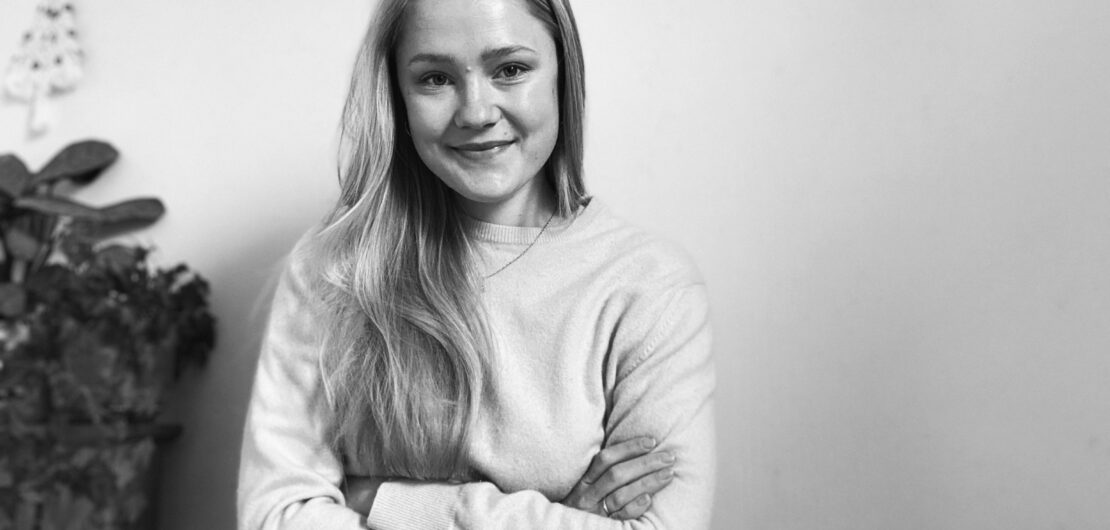 News
News
- 30. mars 202210. juni 2022
- by Esben A. Nilssen

Meet Johanne - the staff writer at ShareLab
Whiskey, ‘why's, and a future world of bio
ShareLab Team, published 30 March, 2022
“I was a definitely ‘why’ kid”, Johanne Ellingsen explains. And this curiosity burned all the way down to the ‘why’ of life. In the quest for an answer to her ‘why’, Johanne pursued biology as a natural field of uncovering the mysteries at the root of her curiousness. Her initial interest in the sciences has refined into a focus on biotechnology. Her goal for the future is to aid the development of biobusiness as a tool in solving pressing issues of our time. And in her role as staff writer at ShareLab, she investigates businesses wanting to do just that.
As the tale of the dancing birds of paradise was told on TV by Sir David Attenborough, Johanne’s fascination for biology was born.
As the tale of the dancing birds of paradise was told on TV by Sir David Attenborough, Johanne’s fascination for biology was born. Throughout her school years many subjects captivated her interest, and at different points in time she wanted to become an IT engineer or study international relations. However, the interest in the system of life lingered and persistently more than all the rest. “One of my favourite exercises in school was to try to explain why some plant or animal looked or acted like it did. What can appear as a random and non-functional part of an organism generally has a logical explanation (although the logic might be somewhat obscure) which is always fun to debate”. However, it was the concept of humans using and manipulating biology to do something we want that was the selling ticket. “I find it extremely fascinating what bright minds can come up with using the toolbox of biology. Whether it be producing beer, meat, a drug or even something as theoretically ambitious as DNA for data storage.”
Johanne is currently finishing a degree in biotechnology at The University of Edinburgh.
The wave of bio-based industry is coming, and the opportunity to join it is one I feel cannot be missed
The field's capability to combine various branches of science was the second major selling point for Johanne. “A primary reason why I chose biotechnology is the interdisciplinary nature of the field. The intersection with computational sciences is an area I am currently exploring in my final year project in which I am evaluating deep learning models for automatic cell segmentation. I also think the field of synthetic biology is very interesting and a space to watch in the future.” Jason Kelly, co-founder of Gingko Bioworks, has stated that the industry of biotech, and more specifically synthetic biology, is now where the informatics industry was in the 1950s. “The wave of bio-based industry is coming, and the opportunity to join it is one I feel cannot be missed.”
...school, time outdoors, and a (cheeky) night out can all be combined
Besides her studies Johanne enjoys exploring Scotland. Having grown up involved in musical theatre, a major appeal of moving to Edinburgh was the thriving cultural scene of the city. Now that Covid is finally easing its grip, the bustling feel of the city is re-emerging. “I do try to sneak in some stand-up or concerts between study-sessions”. She also enjoys spending the weekends outdoors in the natural surroundings of Scotland. They are not always mutually exclusive, however, and school, time outdoors, and a (cheeky) night out can all be combined. “Last week we went on a whiskey distillery tour (and tasting) as a part of a “core skills” course. Consider it one of the benefits of studying biotechnology in Scotland” she smiles.
no plans to ever stop asking ‘why’
After her studies, Johanne is motivated to be involved in innovative ways of utilising knowledge gained through science for problem solving and product development of biobased products. As a member of her generation, she finds it necessary to engage in a field that is actively trying to solve our planet's biggest crisis. “I strongly believe biotechnology will be a key industry in the handling of the climate crisis, in both its root causes and its consequences.” And while she aims to contribute to the answering of many of our most pressing questions as a globalising society, she also has no plans to ever stop asking ‘why’.
__________________
About ShareLab
ShareLab offers fully equipped and serviced wet labs for startups and industrial partners, as well as a community of industry experts and biotech entrepreneurs. The laboratory is located at Oslo Science Park amid Norwegian institutions like University of Oslo, Oslo University Hospital, SINTEF, and a range of life science companies. ShareLab is non-profit and invests all funds in cutting edge laboratories and industrial knowhow to help fuel life science.
Contact
If you would like to know more, you may contact Johanne and the ShareLab Team via LinkedIn or other social media.









